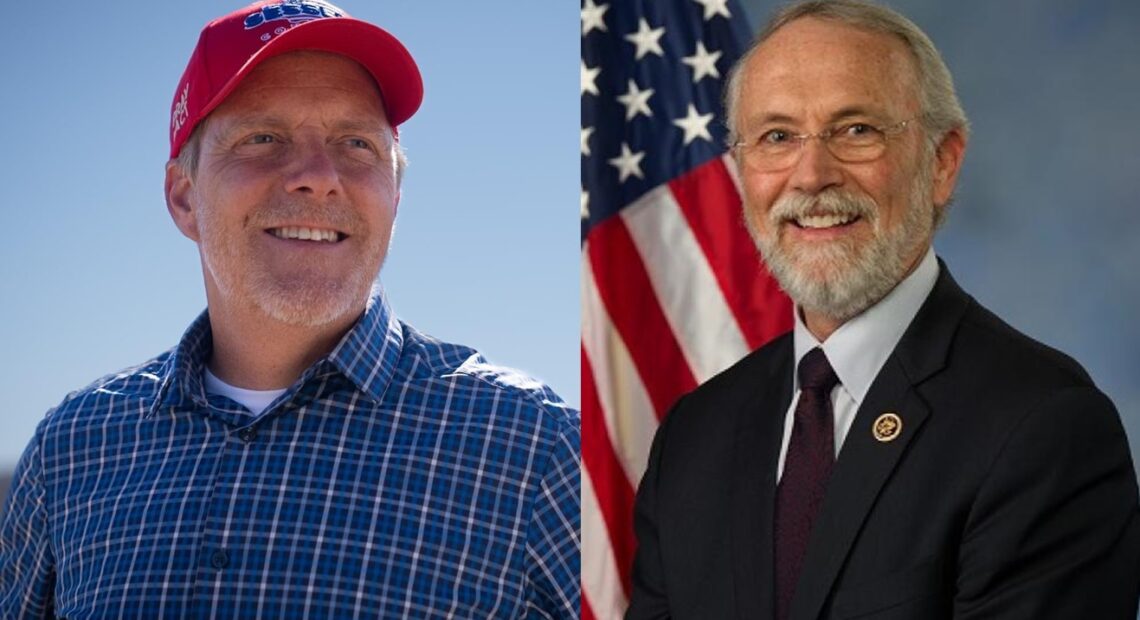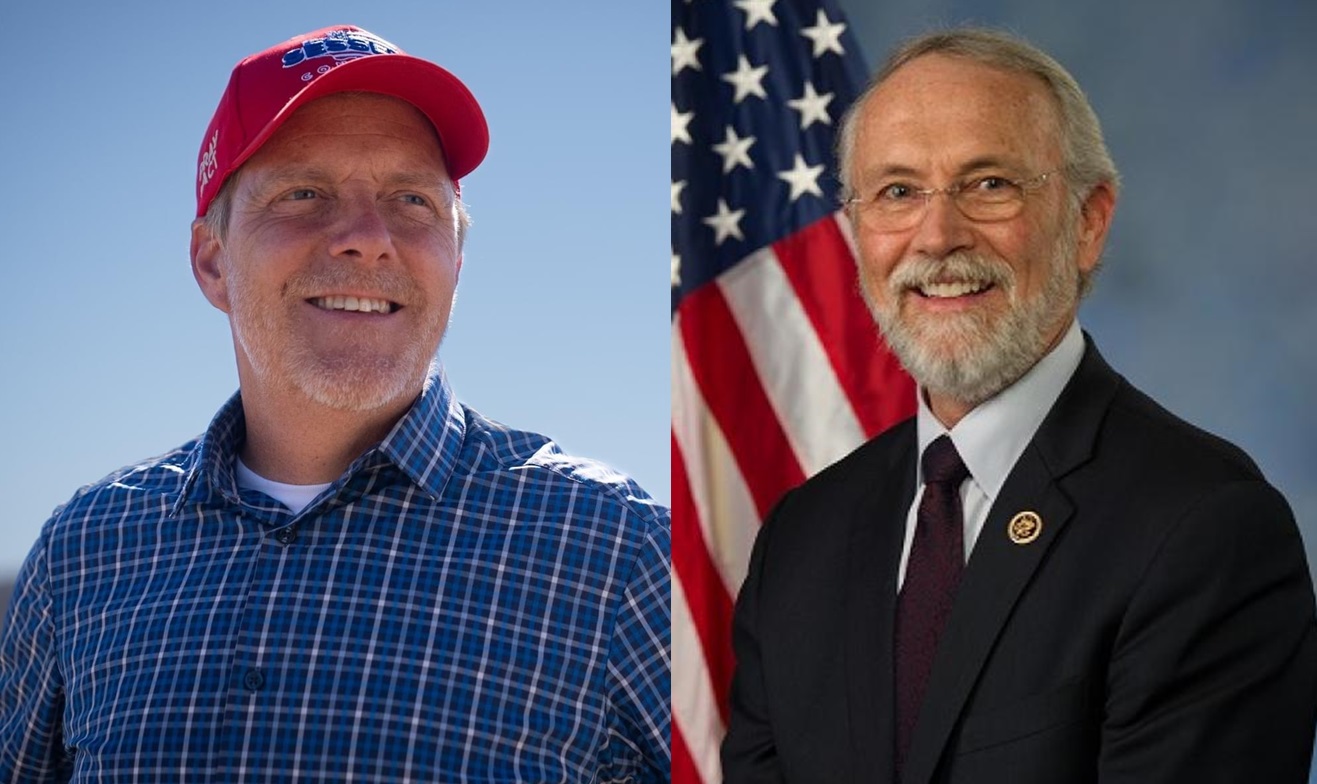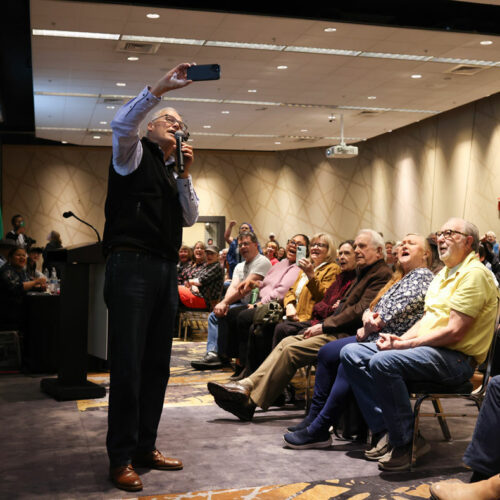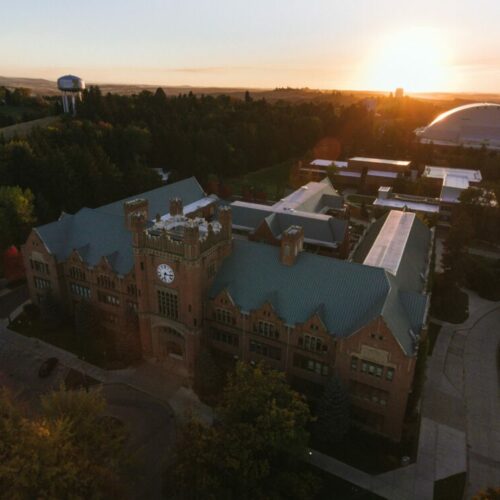
NWPB’s listeners ask, US House candidates for Washington’s 4th Congressional District respond
Read
As part of NWPB’s elections coverage, we surveyed our audience and asked them to submit questions they would like our news team to ask candidates in our region. Here are the responses. This interview has been edited for length and clarity.
Incumbent Dan Newhouse, a Republican, and candidate Jerrod Sessler, a Republican, are running for the U.S. House of Representatives in Washington’s 4th Congressional District.
Newhouse and Sessler were both contacted for this interview. Only Sessler accepted the interview request.
What do you propose to protect democracy further?
Sessler: In terms of protecting democracy, we need to go back to our Constitution. It’s very clear, seven articles, 27 amendments, and there’s very few flaws.
There are some amendments that I struggle with and I think they’re not good for America, but we just need to rely on the structure of our Constitution. We’re almost 250 years in and it has served us very well. There’s many countries that would love to have it, many countries that should have it. But that’s the big thing for me.
I think also having the strength of voice to be able to say when there are, you know, situations where things are divergent where you have two situations that don’t, they don’t come together.
How will you manage policies for visiting workers?
Sessler: It kind of points to on a federal level. One of the things that I would like to see us do is not have our farmers and our agricultural community have to compete in terms of labor force. Right now, the agricultural community has a set of regulations (that’s) … forced by the state, and then they have a structure that’s forced by the federal government. Those are stacked on top of each other.
What I would like to see, and this is a lofty goal, but I would like to create competition in that regulation, which I think will reduce the regulation in a similar manner that capitalism reduces costs.
If a farmer, for example, chooses to use the federal program, then they would be able to choose that or they could choose the state program, but not the two stacked on top of each other.
If workers are coming from foreign countries, then it makes sense that the federal government would involved in that. But in terms of the standards that those people work under, that should be a state issue. But right now we just, we have those two things stacked on top of each other.
We have the H-2A and H-2B programs, which are federal programs, but then we also have the state programs. It makes it very difficult and very expensive for the ag community. I’d like to separate those and force the states to compete with other states and to compete with the program that the federal government offers.
Hopefully, that would bring some sanity to the programs because there’s some competition instead of this just staunch, like ‘this is the way it’s going to be.’
Listeners asked about immigration and having enough workers to support our farmers. What are your thoughts about the relation between both issues?
Sessler: I think that our federal government needs to be supportive of what the agricultural needs are, and really it could be manufacturing in the future. President Trump has talked a lot about wanting to bring manufacturing back to the country.
As a manufacturing engineer, I personally believe that it’s very important that we manufacture everything that we use here in America.
From a strategic and security standpoint, for the safety of America, we need to manufacture things here again. There could be a big need, a growing need in the coming years for more workers, for the manufacturing community as well.
We should also be looking at bringing the best of people throughout the world, allowing those people to come to America so that we can create, design and invent and patent things here in America.
It’s not just the workforce, the manufacturing agricultural community workforce, we need to. The federal government needs to have programs that allow people to come in.
In years past, when I was a kid, companies would say: ‘Hey, I need 120 workers for three months during this window’, and they would submit that, and they would get those workers and they would pay them. Then those people happily left and they took all that piles of money back to their home with them. That’s how I feel about that.
What I’m referencing prior is that once the federal government opens those doors and then they get to the state, they’ve got all these regulations related to, for example, the H-2 programs, but then also the state regulations for all the stuff that’s stacked on top of that, which in Washington state is a very long list.
What specifically are your plans to protect Pacific Northwest natural resources while balancing with business and population pressures?
Sessler: I think one of the biggest threats to our life, and our lifestyle … but one of them that I pull out is over-environmentalism.
I’m a Christian. I love God, and I believe God created the Earth. I think he created it for us. I’m an environmentalist. I think that we should take care of this earth in a way that is commiserate with the responsibility that God has given us.
That said, I don’t think that we should allow over-environmentalists to manipulate us into manipulating regulation and how we live our lives as a result of their perspective, which is not always accurate.
God has told us to take dominion over the world, this Earth, and that’s exactly what I think we should do.
Let’s talk about what some of those natural resources are. Our power-generating dams, which puts Washington state in a unique situation to generate about 60% of our energy from hydropower, which is amazing. We need to protect those dams.
If you look at the statistics, the dams that they are targeting that they want to take out have beautiful fish ladders, which allow … fish to navigate up beyond those dams to be able to spawn and to be able to reproduce and send their little babies out to the ocean so that they can grow into future salmon.
That’s one example, that they want to tear down the dams, not because of the fish. They want to tear down the dams because of their, I guess, desire to return Mother Earth, as they call her, to its original state.
Do you support health care for women, including abortion access?
Sessler: I’m a conservative Christian. I was also diagnosed with terminal cancer 25, 26 years ago.
My mom was a nurse for 30 years, and my first official job was working in a hospital, (in the) X-ray department, developing X-rays and helping with X-ray procedures.
I’m very familiar with the medical community and also very familiar with true health care. I’ll say that one of the fallacies that we have in America today is the fact that we call this insurance that we buy health care, but it’s not, it’s an insurance and it would be more accurately called ‘disease care.’ It’s primarily called that or should be called that because we live ourselves into it … primarily with the things that we eat, with the packaged and processed foods and lots of snack foods and lots of things that, sort of eating like kings every single day, rather than just going back to the basics: eating whole raw foods.
We raise our own cattle. We have pigs, turkeys, chickens, the eggs that we eat are straight literally out of our bird. So, I think people need to take personal ownership of their health. When I was diagnosed, they said I was going to die. I had a 5 % chance of living. So I didn’t do conventional medical treatment. I just changed my diet, changed my lifestyle. I lost 70 pounds. That was over 25 years ago. I’ve really learned since then taken lots of steps to learn how to get more healthy and how to stay healthy and how to raise healthy kids and all that kind of stuff.
That’s kind of my take on it. I don’t believe in a sort of universal health care because to me, if you look at it more accurately as I described it, that what people are talking about is actually disease care. … I think we ought to push more of that responsibility down to the states in the same way that the Supreme Court did with Roe v. Wade. Pushing that responsibility down to the states and allow them to determine what’s going to happen within their state.
Then I’ll just say anecdotally, I know people are going to say that I’m, I’m being evasive in my answer, but I’m personally a conservative Christian. I personally don’t think that abortion is something that I support. The issue is to me, as we’re fighting an argument that is age-old with methods and with thinking that is also just as age-old.
How will you work across the aisle to solve the very real problems we face: climate change, income inequality, and racism?
Sessler: I think it would be easier to address the portion about working across the aisle. As a member of Congress, I think it’s our responsibility to do the best we can for the American people. That said, it is the place of compromise.
… I think one of the big challenges in America today is many people, me included, feel like there’s a faction within the country that has moved things so far left that it has violated our conscience in a way that makes it very difficult to even negotiate with those people. …(There are) other things, structurally and socially, that are problematic with that as well. I mentioned earlier (in) the question about energy, my perspective on over-environmentalism. I think over-environmentalism is one of our biggest threats to our future.
There’s other things as well. There’s globalism. There’s the argument between the coming cryptocurrency, whether it’s centralized or decentralized and how do we manage that? How do we work through that, not allow the government to leverage the people in ways that are not correct?
… The person asking the question isn’t going to like my answer because I don’t agree with the presupposition that we have a(n) existential threat that is climate change.
I’m an engineer. You look at the data, and the data does not support that we have a threat.
… The other things are with regard to racism. I always look at these examples, and I’m sorry if this offends people. I’m looking for something that is truly white here because people call me white and I just want to give an example here.
This is a piece of white paper and my shirt here is white. You see, I’m not white. I’m lighter skinned. You have different color skin than me because we’re not the same person, you know, other people have different colored skin.
I think it’s just, so, it’s honestly, it’s like intellectually offensive for people to say or to argue that we have some systemic racism, is an issue that that’s beyond anything that all of us don’t already agree with. I mean, we don’t agree on being segregated by our color, by our race, or maybe by our language, or even by our religion or different things like that.
It’s like we’re all human beings in God’s eyes, and I don’t think the color of your skin matters. I also don’t believe that we have systemic racism in America. I’m 55 years old, and I grew up in an America where my parents and my grandparents used very racist slang. I grew up in that environment, but I don’t use it today because it was not the way it was.
It was not the way our generations, our society was moving as I was growing up. So, although I saw it in people that were older, I didn’t carry it forward myself because as a country we’ve always been moving away from that, and it’s primarily been the Republican Party that has helped us to do that during the Obama years.
It was all completely lit back up and revved up. So we need to do the work of sort of backing that stuff out and getting that out of our language and just making sure it has no place in America. So anyway, I doubt that pleases your viewers, but that’s my view.
What plans do you have to protect the electorate from disinformation?
Sessler: None. I don’t believe that we should be protected from information. I think that we should get all of the information and we should be allowed to use these cool things inside of our head: the brains, and allow them to figure out what’s actually true.
If we don’t have a full breadth of information, if we only have this, this little block of information over here, then we’re going to have to pick something in that arena as what we feel like is truth, but if we have the whole breadth of information, then we can look at it all and we can look at our life experiences and our knowledge, and we can say, ‘OK, this is where I land in this. This is what I think is true.’
So, I think people should be allowed to get all the information and if they don’t like it, don’t listen to that channel anymore, don’t listen to that person anymore.
Do you trust election integrity, and will you concede if you lose?
Sessler: I don’t have a lot of faith in our election system only because of the influence of technology and it’s odd that we can have these election machines that have software that’s built by private companies … to me, that brings great question.
In terms of that’s, that’s primarily where that seems to have been abused, has been on a national level, but it could be on a local level as well. We’ll see what happens with this election. I have no plans, nor do I have any, to work afoot to verify the integrity of our elections other than just my own work in my own counties.
We cover about eight counties and knowing the work that they do to, to be able to gather votes and count those votes and I don’t expect there to be any nefarious work happening in our race. I think most of that has been focused on the national level, but I could be wrong. It would be very easy for them to drill down to local level and to meddle in the elections.
It is against another Republican who votes primarily against a lot of the values that the people of my district believe in. And so, I don’t know that this district would be a target for that sort of fraud to happen, and I don’t honestly even know all the details in terms of how that happens.
My big question is simply this: Why don’t we vote in person on a specific day using identification so that we know who the people are? We know that each person gets one vote so that we can have an accurate vote. And I think anybody who disagrees with that or argues with that is exposing the fact that they really want to manipulate the elections.
It’s not about efficiency. I think all of us would give up a day of our lives every couple of years if we could guarantee that elections had integrity.
















